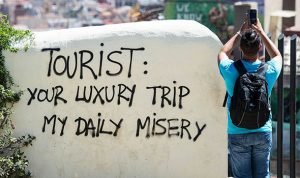Last year there was much ado in the news about protests against tourism at a number of popular destinations. Although it may appear to be localized it is important as a traveler to be cognizant of the issues, of which there are many. The intent is not to stop you from traveling, but rather to develop an awareness so that your future travel plans are made with a consideration of how to travel both respectfully and sustainably.
As a traveler who enjoys both cruising and independent land travel my research indicated that there are issues with both, so I will separate the two. Next week’s article will discuss the cruise industry. This week we will focus on land tours.
Although Barcelona was the most frequently mentioned in the news, there were concerns voiced in Amsterdam, Venice, Athens and the Canary Islands among others. Although many citizens still feel that tourism is an economic boon to the area, it is the way that over tourism has stretched resources to the detriment of the local population that is at the heart of their protests.
Housing
Short term rentals, although lucrative for the property owner, is reducing the amount of rental space for locals and increasing the cost of rent exponentially. For example, according to Euronews Travel, rent in Barcelona increased 68% over the past decade leading to a plan to rid the city of tourist flat licenses by 2028. The same holds true for Amsterdam, who has implemented 75 different measures to control nuisance tourism.
Protests
Although most protests are around the housing issue, congestion of coaches in the city centers and pollution are also concerns. Most protests are peaceful in nature, designed to raise awareness. Last summer a number of tourists were sprayed with water guns in Barcelona but that was an exception. Even so, seeing “tourist go home” signs can be disconcerting.

Environmental Issues
On our recent trip to Bali we noticed issues around disposal of sewage waste and plastics, water usage, exploitative interaction with wildlife and loss of essential farm land for resorts. Being aware of these issues when choosing your accommodations, reducing and reuse plastic and water, and refuse to participate in tourism activities that exploit animals.
Tourist Tax Increases
Regional taxes, daily fees and increased temporary fees are becoming more prevalent. Last year Venice introduced a €5 day visitor fee designed to deter and potentially offset the costs associated with over tourism. Venice collected €2.4 million according to many sources, proving that it does work. It should come as no surprise when it was announced that the fee will return between April and July for 2025, with the addition of an to €10 if you book within 3 days of arrival. Many cities and hotels already charge an additional daily fee.
Nuisance Behaviours
One of the 75 measures introduced in Amsterdam to control tourism was a “quiz” designed to ensure those spending time there are aware of the rules, especially in the coffee shops and red light districts that are so attractive to young male tourists. Other places, such as Italy and Greece, are concerned about disrespectful behaviours that result in damage to fountains and statues and unsafe behaviour while attempting that “perfect” selfie.
In light of these and other issues what can you do to make 2025 the year of sustainable and respectful travel. Consider these suggestions;
- Respect local customs and regulations. Understand that a tourist tax or entry fee, is part of their efforts to manage tourism sustainably.
- Be mindful of noise levels, especially in residential areas.
- Try to learn a few words of the local language, which goes a long way in showing respect.
- Support local businesses rather than just sticking to tourist traps. This helps spread the economic benefits of your visit.
- Make use of public transportation such as buses, metro and trains to reduce the carbon footprint.
- Visit in the off season when tourist levels are otherwise low.
- Consider spending a night or two in each city, rather than just dropping in for a few hours. This allows for a deeper engagement with the destination and its people.
Next week we will review the tourism concerns within the cruise industry.
